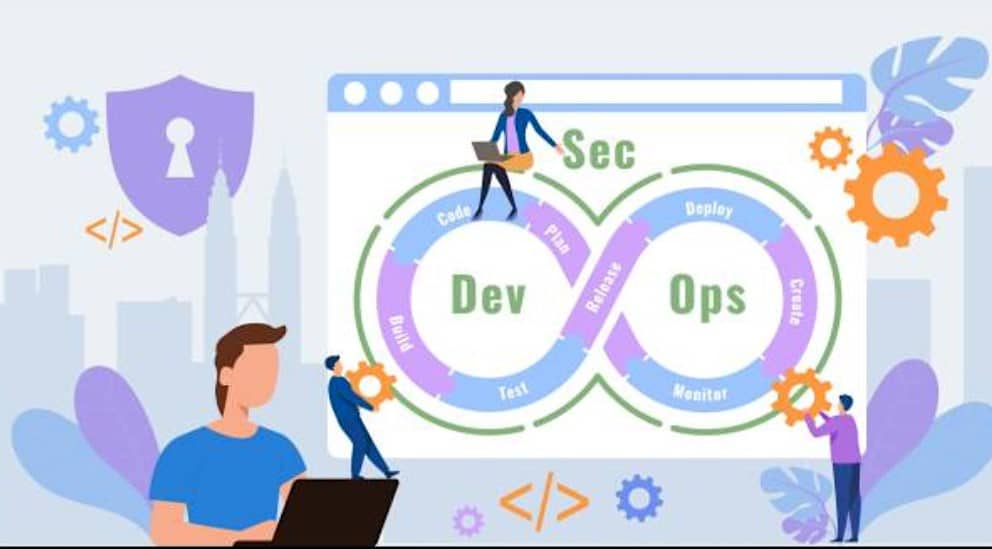DevOps vs DevSecOps: If DevOps is becoming increasingly common in the vocabulary of companies, the same cannot be said for DevSecOps. DevSecOps represents an evolution of DevOps that places a strong emphasis on security in the design of software or applications. So, what are the differences between the two, and what similarities do they share? That’s what we’re going to explore.
DevOps vs DevSecOps - What are they?
Definition : Devops
The DevOps movement is the alliance between design, development, and IT system management. In this approach, developers and IT infrastructure administrators collaborate to optimize the speed of software delivery and its quality.
The emergence of DevOps within companies signifies a real upheaval, both in terms of work methods and mindset. It involves implementing an agile approach to enhance the final product.
Definition : DevSecOps
DevSecOps is an abbreviation for Development, Security, and Operations. In French, this involves development teams, cybersecurity experts, and IT operations professionals.
In addition to delivering quickly and high-quality applications, DevSecOps also ensures their security.
To achieve this, DevSecOps teams must pay special attention to existing vulnerabilities. Security becomes a shared responsibility among different stakeholders throughout the software development cycle.
DevSecOps emerged after DevOps in response to the increasing cybercrime threat. To counter hacking attempts and safeguard data, security processes have become more rigorous and time-consuming.
However, these new procedures can hinder the work of DevOps and extend production timelines. For example, if the software didn’t meet security standards, it might require revising faulty code or improving the security of the release, all of which would happen after the product was already completed.

With the introduction of the DevSecOps model, development and operational teams have all the tools they need to make the best security decisions right from the beginning of the process. On the other hand, security teams are adjusting their processes to maintain an agile working environment.
Integrating security considerations at the design stage ensures the rapid delivery of a high-quality, robust, and secure product.
What are the similarities between DevOps vs DevSecOps?
When we compare DevOps vs. DevSecOps, it’s important to understand the similarities between the two functions:
Automation: Both DevOps and DevSecOps heavily rely on automation. DevOps uses AI to automate software development, employing tools like Jenkins, Docker, Ansible, Nexus, Artifactory, Kubernetes, and more. Similarly, DevSecOps utilizes AI solutions for security checks and vulnerability risk detection. The idea is to proactively identify anomalies and address them swiftly.
Continuous Monitoring: Real-time data analysis is crucial for both DevOps and DevSecOps. It allows for ongoing improvement of the product, encompassing aspects of quality, speed, and security.
Collaboration: Both DevOps and DevSecOps are built on a culture of collaboration. Developers, administrators, and cybersecurity experts need to maintain constant communication to achieve desired development goals, from project inception to completion.
Iteration: Both models embrace the iterative principles of the agile methodology. This means progressing in small steps and making improvements as you go along. It’s about reacting promptly when cybersecurity vulnerabilities are detected or when customer satisfaction needs to be addressed.
What are the differences between DevOps vs DevSecOps?
DevOps and DevSecOps primarily differ in their objectives.
For DevOps, the primary goal is to deliver a quality product quickly. Emphasis is placed on the speed of delivery and the efficiency of the software, ultimately aiming for overall user satisfaction. To achieve this, development and operations teams share common goals, tools, and performance indicators.
However, in their focus on these aspects, DevOps teams sometimes tend to overlook security, which can jeopardize assets, user data, and organizational applications.
This is where DevSecOps comes into play. It represents an evolution from DevOps because here, the emphasis is on security.
Cybersecurity considerations are now fully integrated into the pipeline, not just at the end of the software development process but right from the beginning.

Security, development and operation are linked throughout the project.
The end-user receives software that is compliant, efficient, delivered quickly and securely. End-user satisfaction is maximized.
DevOps vs DevSecOps - What does the future hold for software development?
If DevOps represents a cultural revolution for some companies, they must take it a step further by integrating security into their software development process.
Data protection issues have become increasingly prevalent due to the proliferation of cyberattacks. Therefore, integrating DevSecOps into teams is essential, offering multiple advantages:
1. Enhanced Application Security: DevSecOps takes a proactive approach to security, mitigating cyber threats from the very beginning of the development lifecycle.
2. Maintaining Delivery Timelines: By integrating automated tools for cybersecurity audits and testing, development cycles remain on track without slowing down.
3. Team Engagement: DevSecOps brings together development, operations, and security teams right from the start of the process. This enables everyone to incorporate various concerns, such as customer satisfaction, swift delivery, and software security.
4. Reducing Security Vulnerabilities: DevSecOps can quickly identify and address security vulnerabilities, reducing their impact.
DevSecOps is ultimately an evolution of DevOps to address the challenges faced by businesses.
It’s not always necessary to overhaul the entire organization to transition to this stage; sometimes, it only requires training teams to incorporate security concerns.
Are you interested in the DevSecOps culture? The training offered by DataScientest provides the essential knowledge and skills to master it.










